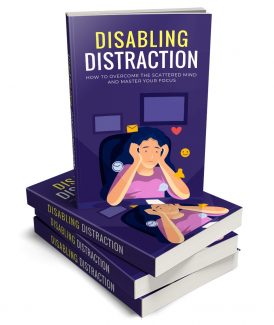 License Type: Master Resell Rights
License Type: Master Resell Rights  File Type: ZIP
File Type: ZIP
 SKU: 64323
SKU: 64323  Shipping: Online Download
Shipping: Online Download
Sample Content Preview
Introduction
Have you ever imagined why your workdays spiral out of control? Do you plan your day sometimes and notice that you are distracted within just a few hours? Do you find yourself procrastinating or find it difficult to concentrate on your tasks? Does that sound like what usually happens to you?
Now, imagine yourself at the end of the day, breathing a sigh of relief, knowing that you've accomplished everything you need to. Again, how will you feel knowing that you are on top of all your activities while executing them effectively? Of course, you will probably sleep well at night with your mind at rest.
May I inform you that you can be more productive, and effective in executing whatever task you set out to do, rather than being tired behind your office desk with piles of unfinished projects? May I also inform you that there are several ways in which you can improve your productivity and effectiveness on tasks? Yes, it is possible, and that is the reason this book is compiled.
For two reasons, many people are not as productive as they wish, or think. The first reason is that the default setting or our mind is in a scattered state, and we are reactive about it, instead of being proactive. The second reason is that many bad habits interfere with our productivity. These two reasons are what keep drawing people back from their goals and prevent them from being productive.
Further, the importance of being productive can't be ignored, both in our personal and professional lives. If you run a business or are responsible for a team, you will want to ensure that everything goes according to plan without ignoring your productivity level. This is because your level of productivity is what will determine your level of success.
As we go through life, a lot of factors will inevitably want to contribute to why we can't be productive. However, if you are aware of how to tackle these factors, you can easily shield yourself from them, and become more effective and organized in your tasks.
Now the question: how can we become more productive and regain control? Please understand that there is no one-size-fits-all approach, as only a systematic approach will work. However, it starts with putting our minds in order and substituting some reactive habits with good ones.
Do you want to know how to put your scattered mind in order and be able to focus better? Do you want to learn how to substitute those habits that keep you from being productive for the ones that will increase your productivity? Then this book will be offering you approaches that are geared towards that effect. And if you think you were productive, but not anymore, this book is also for you.
Read on and take charge of your mind.
Chapter 1: Tips to Manage Your Scattered Brain
It is advised that you do away with anything that will take away your attention off this section of the book because of the few questions that would be asked. Try as much as possible to answer them sincerely, and as best as you can:
Do you have something you have to do, but it remains undone because there is no external push or deadline attached to it?
Do you get distracted easily because everything in the world seems fascinating to you?
Do you have a low motivation to begin something you would like to achieve?
Do you usually veer off a task when you are at it?
Do you think you want to do millions of things at once?
May I inform you that you are a scattered brain if your answers to these questions are “yes”? Permit me to welcome you to the club. Surprised? You are not the only person in this circle of the scattered brain. There are thousands, and if not millions of such people out there.
While it might seem like a negative thing, understand that there is nothing wrong with not getting anything done, or being distracted often. You can fall into a stressful trap of avoidance, or even trying to cover up for lost times or something worse when it becomes constant.
But to help you out of this situation, I will be offering some effective tips below to help you deal with your scattered brain. These tips have proven effective for hundreds of people, and I believe they will also help you. However, ensure that you work with as many as you possibly can.
Recognize What You Have to do and Prioritize
In a lot of productivity books and articles, this advice is emphasized. One cannot overstate the importance of this idea. It is simple, clear, and equally very effective in helping you deal with your scattered brain.
You will never get the satisfaction of doing anything if you don't know what you want and stuff is just flying around in your head. You, therefore, have to make a list of everything that is on your mind. Ensure that you prioritize them accordingly. By so doing, you are telling your brain to stop bothering about the little things, and things that can wait, and focus on the most important things.
Break it down, and make it simple
Choose one to start with and break it down to the simplest form of action once you have your list and you can then determine your top two to three tasks. You shouldn't take more than 15 to 30 minutes to complete each step. Break it down further if it takes longer.
Understand that if you have a smaller task, it would be easier to get it done, and the more you would want to stick with it. What you are doing is telling your brain to stay with it for 15 minutes.
Start the task and take it slowly
You might be tempted to speed things up just to save time, but don't. What it only does to your brain is to make it drift to what is next on your table, instead of focusing on what you are doing now. The brain is designed to only focus on one thought at a time. You, therefore, have to only focus on what you have in front of you. Do things deliberately and slowly. Once you complete your tasks, you will feel better.
Break is important
It is not advisable to work nonstop for hours. You will only burn out your energy, which will make you lack the motivation to continue again. Take a break and do something fun after completing a 15-30 minutes’ task. You can read books, articles, or whatever you feel like doing. You can move, stretch, walk, or do something you like doing. All that matters is that you don't take much time. 5-10 minutes is okay to do whatever you want to do; then go back to what you have to do.
Take a longer break, an hour or so, once you complete 4 tasks. You are guilt-free and you can do other things.
- License: Master Resell Rights
- Category:Ebooks
- Tags:2021 Ebooks With Audio Master Resale Rights








